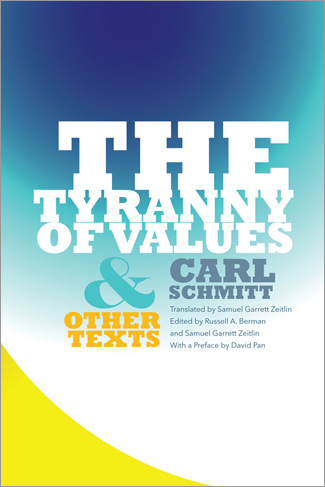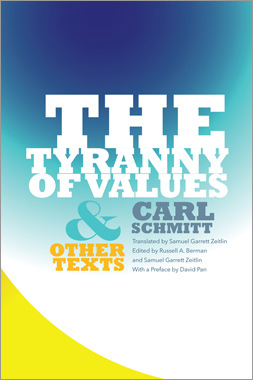By Telos Press · Monday, February 22, 2021 In the Spring issue of American Affairs, Blake Smith writes at length about Carl Schmitt’s “The Tyranny of Values,” the title essay of the collection The Tyranny of Values and Other Texts, published by Telos Press. Edited by Russell A. Berman and Samuel Garrett Zeitlin, translated by Samuel Garrett Zeitlin, and with a preface by David Pan, Schmitt’s The Tyranny of Values and Other Texts is now available for purchase in our online store. Save 20% off the list price by using the coupon code BOOKS20 during the checkout process.
An excerpt from the review:
 To those familiar with his most famous writings, it may seem that Carl Schmitt is an enemy of liberalism. In texts such as The Concept of the Political (1932) and Legality and Legitimacy (1932), Schmitt critiqued the Weimar Republic and the liberal tradition, the weaknesses of which Weimar seemed to embody. Liberalism, Schmitt argued, depends on systematic neutralizations—fictions by which all individuals and points of view are imagined to be equal, and by which the confrontations of political life seem to be transformed into peaceful, rule-governed debates with open-ended, undetermined outcomes. His writings during the Nazi era endorsed a new understanding of politics in which such deceptive procedures are replaced by the decisions of a charismatic leader who acts on behalf of a homogeneous people against its internal and external foes. Radicals of the Right and Left have found inspiration in Schmitt’s analysis of liberalism and calls for moving beyond it to a realistic and engaged theory that recognizes the insuperable conflicts at the heart of politics. To those familiar with his most famous writings, it may seem that Carl Schmitt is an enemy of liberalism. In texts such as The Concept of the Political (1932) and Legality and Legitimacy (1932), Schmitt critiqued the Weimar Republic and the liberal tradition, the weaknesses of which Weimar seemed to embody. Liberalism, Schmitt argued, depends on systematic neutralizations—fictions by which all individuals and points of view are imagined to be equal, and by which the confrontations of political life seem to be transformed into peaceful, rule-governed debates with open-ended, undetermined outcomes. His writings during the Nazi era endorsed a new understanding of politics in which such deceptive procedures are replaced by the decisions of a charismatic leader who acts on behalf of a homogeneous people against its internal and external foes. Radicals of the Right and Left have found inspiration in Schmitt’s analysis of liberalism and calls for moving beyond it to a realistic and engaged theory that recognizes the insuperable conflicts at the heart of politics.
Continue reading →
By Russell A. Berman · Wednesday, August 26, 2020 The following essay comments on the interview with Hans-Georg Maaßen conducted by Moritz Schwarz and published in Junge Freiheit on August 14, 2020. An English translation of the interview appears here.
In the wake of the opening of the Berlin Wall and the collapse of the Soviet Union, it appeared that liberal democracy was on an inexorable victory march around the world. The Soviet satellite states threw off their Communist shackles, and the occupied Baltics regained their independence. Even Russia seemed briefly to be lurching toward modern governance structures, and the Central Asian states, the “stans,” claimed their own sovereignty (if only, often as not, to revert to indigenous forms of authoritarianism). The age of Latin American dictatorships belonged to the past, certainly in the southern cone and in Brazil, although not in Venezuela and Cuba. The last aftershocks of that democratic optimism informed the hope that toppling Saddam Hussein in Iraq would set off a similar democracy wave in the Middle East; no doubt the demonstration of the vulnerability of the dictator in Baghdad set the stage for the Arab Spring of 2011, another burst of hope.
That Arab Spring of hope gave way to a new winter in the Middle East and not only there. The wave of democracy has been followed by a wave of repression. Perhaps one should have paid more attention in 1989, which not only witnessed the November celebration in Berlin but also the bloody June in Beijing, where the democracy movement at Tiananmen was murdered by the Communist Party and its tanks. It was wrong to assume that the formal end of the Soviet Union meant the end of Communism altogether or that Communist agitation would cease to undermine free societies. That old mole continues to burrow.
Continue reading →
By Telos Press · Friday, February 21, 2020 Writing in the new issue of Philosophy in Review, Adam Sliwowski reviews Carl Schmitt’s The Tyranny of Values and Other Texts, translated by Samuel Garrett Zeitlin, edited by Russell A. Berman and Samuel Garrett Zeitlin, with a preface by David Pan. Order your copy in our online store, and save 20% on the list price by using the coupon code BOOKS20 during the checkout process.
An excerpt:
 The works of Carl Schmitt—a German jurist and political theorist infamous for his involvement with National Socialism—continue to have wide international appeal, influencing scholars in a number of fields from political science and jurisprudence to political-theology and existential philosophy. Nevertheless, much of his prolific oeuvre, written over the span of almost 70 years, remains untranslated into English. With The Tyranny of Values and Other Texts, Samuel Garrett Zeitlin takes a step in filling this gap with an edited collection of finely translated and helpfully annotated texts that appear in English for the first time. This collection of occasional pieces, spanning from the Weimar era to the Cold War, shows Schmitt responding to a diverse array of socio-political exigencies and world-historical developments, while also shedding light on many of the central themes of Schmitt’s work, such as the distinction between legality and legitimacy, land and sea, the nomos of the earth, and the figure of the partisan. The works of Carl Schmitt—a German jurist and political theorist infamous for his involvement with National Socialism—continue to have wide international appeal, influencing scholars in a number of fields from political science and jurisprudence to political-theology and existential philosophy. Nevertheless, much of his prolific oeuvre, written over the span of almost 70 years, remains untranslated into English. With The Tyranny of Values and Other Texts, Samuel Garrett Zeitlin takes a step in filling this gap with an edited collection of finely translated and helpfully annotated texts that appear in English for the first time. This collection of occasional pieces, spanning from the Weimar era to the Cold War, shows Schmitt responding to a diverse array of socio-political exigencies and world-historical developments, while also shedding light on many of the central themes of Schmitt’s work, such as the distinction between legality and legitimacy, land and sea, the nomos of the earth, and the figure of the partisan.
Continue reading →
By Telos Press · Friday, February 1, 2019 Writing at Infrapolitical Deconstruction, Gerardo Muñoz reviews the new English translation of Carl Schmitt’s The Tyranny of Values and Other Texts, now available from Telos Press Publishing. Order your copy in our online store, and save 20% on the list price by using the coupon code BOOKS20 during the checkout process.
An excerpt:
 As David Pan correctly observes in the Preface, the Schmitt that we encounter here is one that is confronting the transformations of political enmity in light of a gloomy and dangerous takeover of a global civil war. In fact, one could most definitely argue that the Schmitt thinking within the Cold War epochality is one that is painstakingly searching for a “Katechon,” that restraining force inherited from Christian theology in order to give form to the ruination of modern legal and political order. The global civil war, cloaked under a sense of acknowledged Humanism, now aimed at the destruction of the enemy social’s order and form of life. This thematizes the existential dilemma of a jurist who was consciousness of the dark shadow floating over the efficacy of Western jurisprudence. In other words, the post-war Schmitt is one marked by a profound Hamletian condition in the face of the technical neutralization of every effective political theology. This condition puts Schmitt on the defensive, rather than on the offensive, as his later replies to Erik Peterson, Hans Blumenberg, or Jacob Taubes render visible. As David Pan correctly observes in the Preface, the Schmitt that we encounter here is one that is confronting the transformations of political enmity in light of a gloomy and dangerous takeover of a global civil war. In fact, one could most definitely argue that the Schmitt thinking within the Cold War epochality is one that is painstakingly searching for a “Katechon,” that restraining force inherited from Christian theology in order to give form to the ruination of modern legal and political order. The global civil war, cloaked under a sense of acknowledged Humanism, now aimed at the destruction of the enemy social’s order and form of life. This thematizes the existential dilemma of a jurist who was consciousness of the dark shadow floating over the efficacy of Western jurisprudence. In other words, the post-war Schmitt is one marked by a profound Hamletian condition in the face of the technical neutralization of every effective political theology. This condition puts Schmitt on the defensive, rather than on the offensive, as his later replies to Erik Peterson, Hans Blumenberg, or Jacob Taubes render visible.
Continue reading →
|
|
To those familiar with his most famous writings, it may seem that Carl Schmitt is an enemy of liberalism. In texts such as The Concept of the Political (1932) and Legality and Legitimacy (1932), Schmitt critiqued the Weimar Republic and the liberal tradition, the weaknesses of which Weimar seemed to embody. Liberalism, Schmitt argued, depends on systematic neutralizations—fictions by which all individuals and points of view are imagined to be equal, and by which the confrontations of political life seem to be transformed into peaceful, rule-governed debates with open-ended, undetermined outcomes. His writings during the Nazi era endorsed a new understanding of politics in which such deceptive procedures are replaced by the decisions of a charismatic leader who acts on behalf of a homogeneous people against its internal and external foes. Radicals of the Right and Left have found inspiration in Schmitt’s analysis of liberalism and calls for moving beyond it to a realistic and engaged theory that recognizes the insuperable conflicts at the heart of politics.



